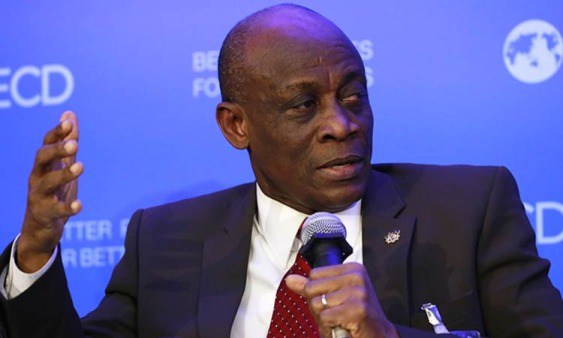Former Finance Minister Seth Terkper has charged government to build up the Sinking Fund to retire the zero-coupon bond that will mature in 2025, as this will free-up resources for whichever government succeeds the present one.
The terms of the zero-coupon bond do not oblige government to make periodic interest payments over its tenor like a coupon bond, but rather at the end of its tenor. In the case of Ghana, out of the US$3billion bond issued by government, US$525million of it was issued as a zero-coupon at a discount of 22 percent.
This essentially means that investors have been given a discount at 22 percent of the zero-coupon bond’s value. Therefore, the actual money that will hit Ghana’s account from issuing the bond is US$409.5million, but the country will have to pay US$525million at the end of the four-year tenor – indicating investors will make a return of US$115.5million on buying the zero-coupon bond.
However, Mr. Terkper said the objective of establishing the Sinking Fund in the country is to manage the redemption of Eurobonds and other debt instruments – the very reason he is pushing for immediate steps to be taken to build up the fund, as was done by the previous government – and more so when terms of the zero-coupon bond do not require government to pay periodic interest on the bond until 2025, a condition Mr. Terkper opines poses potential risk of rollover or default at its due date.
“At the time we did our first sovereign bond, the country did not have a mechanism for retiring bullet bonds. But when the Sinking Fund initiative was launched, we saw the prospect of the country having to retire US$750million at a go in 2017.
“The initiative that was launched by the Mahama administration was to take advantage of the flows into the Stabilisation Fund and the fact that it can be capped and the funds used to retire debt. So, we started building up the Sinking Fund and going into the secondary market; thus, the stock exchanges oversees, and buying back debts we had issued which were tradable.
“By the time the Mahama administration left office, we had retired close to US$340million of the value. With the fall in crude oil prices and realising that we may not be able to take care of the whole amount, US$200million was refinanced using the World Bank-backed guarantee bond that was issued in 2015.
“The Mahama administration was able to leave enough – about US$250million – in the Sinking Fund for the Nana Addo administration to use US$200million to retire the balance of the Kufour bond when it fell due for redemption in 2017,” Mr. Terpker said in an interview with the B&FT.
Government lowered the cap of the Stabilisation Fund last year to US$100million from a previous US$300million in order to use any excess for catering to coronavirus-related expenditure, as the pandemic heavily impacted domestic revenue mobilisation due to reduced economic activity.
The former keeper of the public purse said with the highly anticipated recovery of both the global and local economies from the pandemic, especially as the vaccine roll-out is proving successful in many countries – and with crude oil price also picking up from its lows, it is time to restore the fund to its appropriate cap.
“The nation should not allow this financial calamity to fall on it in 2025 by the zero-coupon bond. With recovery of the global economy and local economy, as government itself has been projecting – and with three oil fields, we recommend that Parliament should approve the setting aside of funds from the excess after the cap over the period from now to 2025 – to take care of the zero-coupon bond which has a face value of about US$525 million; which is about the same amount we used to redeem US$550million from the first sovereign bond from one oil field.
“This is the purpose of setting up the Sinking Fund, and this will be a critical test of the fund’s philosophy. Furthermore, we should ensure that the cap is restored appropriately so that we can put more money in the Sinking Fund for the next crisis; because no country can manage its economy for two or three years without expecting that there will be no crisis at all, whether minor or major,” he said.










